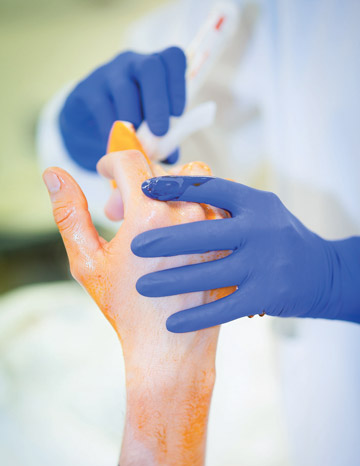CMS requires surgery centers to have infection preventionists on staff. Some facilities assign providers to the role simply to fulfil the requirement, but infection prevention has taken on a greater significance during the pandemic. Facilities are now starting to realize qualified candidates should fill the position.
"Surgical centers are stressful environments for infection prevention professionals, especially now, so having the right person in place is important," says Saskia Popescu, PhD, MPH, MA, an adjunct professor of public health at the University of Arizona in Tucson. "Infection preventionists should at least have the required training and experience — but certification is preferred." (see sidebar.)
The pandemic has only reinforced the important role infection preventionists play in protecting staff and patients from harm, says Nancy Chobin, RN, AAS, CSPM, ACSP, CPER. She points out that COIVD-19 has led to higher enforcement of hand washing protocols, a renewed focus on the proper donning and doffing of PPE and limiting aerosolization of pathogenic viruses in the OR.
Training in sterile processing is also beneficial for infection preventionists, according to Ms. Chobin. "The Joint Commission standards state organizations must reduce the risk of infections associated with medical equipment devices," she explains. "This is one of the requirements cited most frequently as non-compliant during surveys. It appears smaller facilities need more access to the standards that need to be followed. Centers with smaller staffs seem to struggle with meeting the requirements."
Smaller centers have to combat the challenges that come with having fewer staff and resources during an already challenging time. While an increasing number of nurses are seeking certification in infection prevention, this growth is unsustainable. In addition to a rigorous certification process, the job and responsibilities of an infection preventionist are very difficult.
Donna Nucci, RN, MS, CIC, an infection preventionist at Lawrence and Memorial Hospital in New London, Conn., warns of high burnout among infection preventionists and a shortage of qualified candidates to address a national shortage among the ranks.
"Infection preventionists are spending over 80% of their time on COVID-19," says Ms. Nucci, who has been working 12-hour days since the beginning of the pandemic. "I can't imagine the stress of those who work at a small facility, where the entire burden is on them."
Ms. Nucci hopes her field finds passionate providers who are committed to the cause and enter the role with a comprehensive approach to safer patient care. "Moving forward, I think infection preventionists will have to fully understand healthcare policies, reimbursement strategies and comprehensive data analytics," she says.
Ms. Nucci also believes her nursing background has helped her tremendously in the role, which involves collaborating with nurses and nurse leaders about the care they're providing.
Infection prevention may not be a revenue-producing specialty, but being able to provide safe patient care during the pandemic has highlighted the importance of investing time and resources into ensuring facilities are staffed with skilled professionals with the expertise and commitment to promote proper cleaning, disinfecting and sterilization. OSM
.svg?sfvrsn=be606e78_3)

.svg?sfvrsn=56b2f850_5)